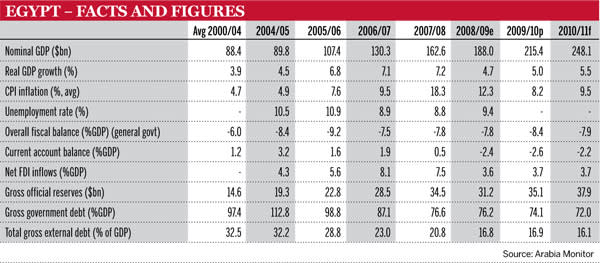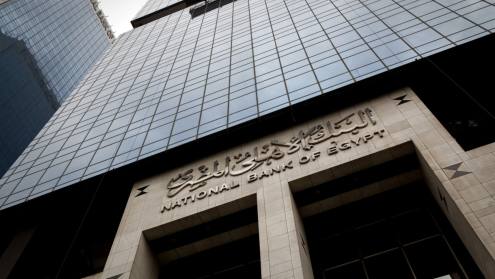In the aftermath of the recent financial crisis, a number of governments around the world reacted by undertaking an expansion of fiscal policy, an approach that received a ringing endorsement from the International Monetary Fund. Far from disrupting that consensus, the Egyptian government adopted a similar strategy. Its efforts have been rewarded: the country's economic growth rates remain above 4%, higher than the average for the period between 2000 and 2004. Moreover, its current account balance is showing signs of narrowing and the economy is on course to record growth closer to 5% this year.
The Boutros-Ghali effect
Egypt's economic success is due in large part to its acclaimed finance minister, Youssef Boutros-Ghali. From 2004, Mr Boutros-Ghali instituted a programme of reforms that sought to strengthen the government's finances. Key measures included an extensive tax overhaul, which reduced rates and categories in customs, stamp and income tax. He also introduced new property taxes and increased penalties on tax evasion.
The financial crisis saw the government halt fiscal consolidation in favour of expansion, with the aim of steering Egypt away from recession. Mr Boutros-Ghali's 2009-10 budget outlined an expenditure agenda costing $59bn. A $1.8bn stimulus package was also announced, for the purpose of investing in the country's infrastructure. In spite of the rise in spending, Egypt is still expecting to stay within the government's targeted budget deficit of 6.9% due to the pre-crisis measures.
An important ingredient of Egypt's success lies in its highly diverse economy. A number of sectors provide the backbone of economic activity in the country, with energy, agriculture and industry being among the most significant. Having such a diverse base obviously allows for greater stability, particularly in times of economic hardship.
A potential concern for the economy is an expected increase in inflation as a result of the fiscal expansion. The 2009 average for inflation stood at 11.5%. Furthermore, the Central Bank of Egypt has begun to ease its interest rate-cutting strategy in light of the shift in inflation.
Suez Canal traffic and receipts have slowed down as a result of global economic conditions. Revenues from the Suez Canal stood at about $390m in December 2009, representing a year-on-year decrease of 0.5%. The country's trade deficit could also widen; non-oil imports increased by 11% quarter-on-quarter in the third quarter of 2009 while exports declined in the same period.
"Egypt's labour market is highly dependent on the export sector, which leaves it exposed to a potentially slow global recovery. There is a particular vulnerability to the EU, which absorbs a large proportion of Egypt's exports," says Florence Eid, founder and CEO of Arabia Monitor, a London-based research and advisory firm specialising in the Middle East and north Africa.
Unemployment also remains a concern. The figure has increased recently; unemployment stood at 8.6% in the third quarter of 2008 but grew to 9.3% in the corresponding period a year later. Given that the population of the country is close to 80 million and continues to grow quite rapidly, the economy has a real task on the front of job creation.
Core strengths
In spite of those issues, there is good reason to be hopeful about the economic outlook of the country. Egypt's foreign reserves remain substantial, estimated to be $34.2bn at the end of 2009. The country's promising hydrocarbons sector remains a big draw for foreign direct investment and is expected to generate about $7bn in inflows over the current financial year. Those two factors are expected to help cover widening current account, trade and fiscal deficits.
Egypt's banking system also has its part to play in supporting the country through the present climate, according to Hisham Ezz Al-Arab, chairman and managing director of Egypt's second biggest bank, Commercial International Bank. He says: "Egypt's economy is investment-driven; the country's total implemented investments reached $36bn over each of the past two years. A majority of these investments were mandated by the private sector. One of the core strengths of the Egyptian economy is its banking sector's liquidity, which is able to support the country's investment expansion opportunities."

Egypt - Facts and figures











